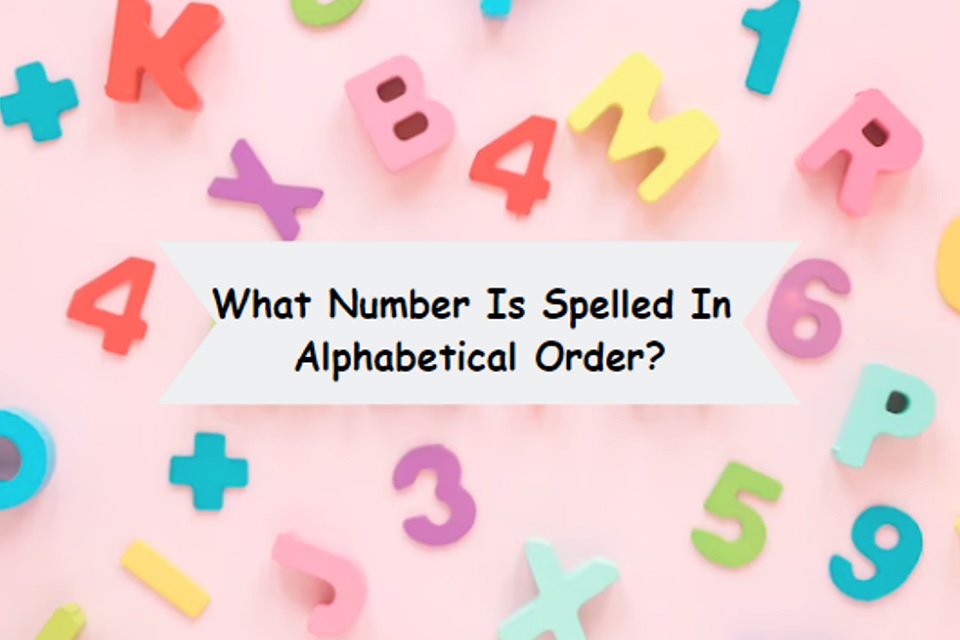
Have you ever wondered what number is spelled in alphabetical order? It’s a curious question that can be approached from different angles.
Alphabetical order is a system of arranging letters in a specific sequence. Interestingly, only one number can be spelled this way – “forty.” The letters in the word “forty” appear in alphabetical order, making it a unique example of a number that can be spelled in this manner.
In this article, we’ll explore the concept of spelling numbers in alphabetical order, the rules and patterns involved, and some examples to illustrate the idea. So let’s get started!
Spelling Numbers in Alphabetical Order: An Overview
In English, we use the alphabet to represent sounds and symbols. Each letter has its unique identity and a specific position in the sequence. When we spell a word, we combine letters in a specific order to form a meaningful expression. For example, the term “cat” consists of three letters (C-A-T) that follow each other in a specific sequence. We can also spell longer words, such as “alphabetical” or “pronunciation,” by arranging the letters correctly.
But what about numbers? Can we spell them in alphabetical order too? Yes, but with some caveats.
Unlike words, numbers are not made up of letters but of digits (0-9). However, we can convert digits into letters using a simple mapping system, where each number corresponds to a specific letter, as follows:
| 0 | O |
| 1 | A, J, or I |
| 2 | B, K, or R |
| 3 | C, L, or U |
| 4 | D, M, or V |
| 5 | E, N, or W |
| 6 | F, O, or X |
| 7 | G, P, or Y |
| 8 | H, Q, or Z |
| 9 | I or J |
By using this mapping system, we can spell any number in alphabetical order by replacing each digit with its corresponding letter and arranging the letters in the right order. For example, the number 123 can be spelled as “ABC” or “AKR” or “AIR,” depending on which mapping system we use.
What number is spelled in alphabetical order? The answer is “FORTY”
- F is the 4th letter
- O is the 15th letter
- R is the 18th letter
- T is the 20th letter
- Y is the 25th letter
As you can see from the above example, the alphabetical order arranges alphabets in a sequence i.e., 4 – 15 – 18 – 20 – 25, which makes it unique.
Rules & Patterns For Spelling Numbers In Alphabetical Order
Now that we know how to convert digits into letters, let’s see what rules and patterns govern the spelling of numbers in alphabetical order.
Here are some key points to keep in mind:
- Leading zeros are ignored. For example, the number 007 is spelled as “OG” (since 0 corresponds to O), not “AOG.”
- Digits that correspond to the same letter can be repeated. For example, the number 22 can be spelled as “BBK” or “BRR” or “KRR.”
- Digits that correspond to different letters must be spelled in the order of their corresponding letters. For example, the number 123 must be spelled as “AIR” (since A < I < R), not “RIA” or “ARI.”
- When comparing two sequences of letters, the first differing letter determines the order. For example, the sequence “ABC” comes before “ABD” (since C < D), even though the rest of the letters are the same.
- The alphabetical order of numbers is not unique, meaning that different numbers may spell the same sequence of letters. For example, the numbers 123, 126, and 129 all spell “AIR.”
Examples Of Numbers Spelled In Alphabetical Order
To illustrate the concept of spelling numbers in alphabetical order, let’s look at some examples. Here are ten numbers and their corresponding spellings in alphabetical order:
| 23 | “BL” (B < C < L) |
| 456 | “DENV” (D < E < N < V) |
| 7890 | “HQYI” (H < Q < Y < I) |
| 1111 | “AAAA” (repetition allowed) |
| 999 | “III” or “JJI” (9 can map to either I or J) |
| 420 | “DOW” (D < O < W) |
| 7777 | “GGGG” (repetition allowed) |
| 9876 | “IHVW” (I < H < V < W) |
| 8675309 | “HTOJLCE” (H < J < L < O < T < C < E) |
| 314159 | “CLNQIW” (C < I < L < N < Q < W) |
As you can see, each number has a unique spelling in alphabetical order, even if some numbers can be spelled in different ways. Also, note that longer numbers tend to have more diverse spellings, and the alphabetical order becomes more complex and harder to predict.
Takeaway
Intriguing queries like “What number is spelled in alphabetical order?” evoke a sense of amusement and inquisitiveness similar to playing with a Rubik’s cube or solving daily newspaper puzzles.
